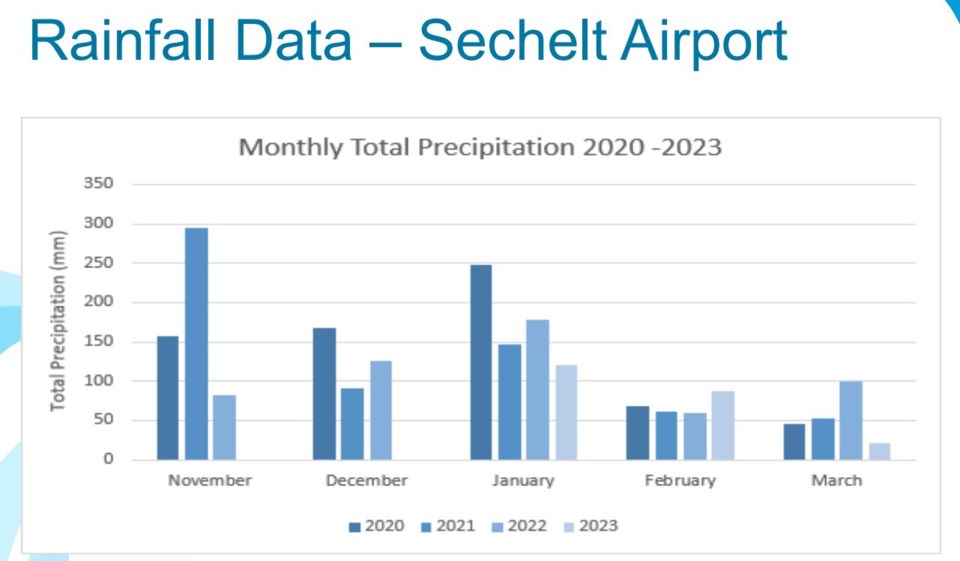Regional district staff detailed 2023 Chapman water system scenarios based on repeats of 2021 or 2022 weather conditions at an April 6 committee meeting. Both revealed Church Road well supply, to be added when Stage 2 restrictions come into force, should allow the time at Stage 3 restrictions (if called) to be extended, with less time at Stage 4 (if needed).
“Each day that Church Road well field is operational there is reduced use of Chapman and Edwards Lakes, and therefore increased storage capacity that will extend water supplies further,” the staff report noted.
2023 conditions reflect 2021 (so far)
The weather comparisons used three factors. Snowpack surveys indicated that to date 2023 looks similar to 2021 with moderate snow accumulation levels. Higher snow levels were recorded in 2022. Manager of utility services Shane Walkey outlined that snowpacks as of April 1 at Chapman and Edwards Lakes are at 86 and 90 per cent of average respectively, with the potential for more snow in coming weeks depending on temperature levels. The next measurements will be taken May 1.
Precipitation in the first three months of this year (as recorded at Sechelt airport) showed this year’s levels lower than in either of the two previous years. Current totals are closer to 2021 levels than to those of the wetter early spring of 2022.
The third weather scenario comparison point was the extent of the mid-year drought. In 2021, the Coast's dry weather ended in mid-September, but in 2022 lasted until December. The extent of 2023's mid-year dry conditions is yet to be determined but staff's written report cautioned that “In the most recent Environment Canada and Climate Change Spring Bulletin, staff noted that the effects of drought are persisting and many stream flows and groundwater well levels are below normal around the province”.
"Chapman is a rain-dependent system," Walkey stated, as he explained how weather conditions moving forward were the major unknown in forecasting how the system will fare this summer. He outlined that staff now meet weekly to review eight factors, relating to weather, stream flow forecasts, the rate of lake level decline, water use and water system performance to make recommendations on water use restriction levels.
The Farmers Almanac long-range weather forecast for British Columbia to October 2023 cites that April and May will feature near-normal temperatures, with precipitation below normal in the southwest. “Summer will be warmer and rainier than normal, on average, with the warmest periods in mid-July and early August. September and October will be warmer and wetter than normal” it reports.
Adding more water this year
Sechelt area director John Henderson said “a stroke of a pen” by the province could enhance supply by approving the SCRD’s requested reduction in the Chapman Creek environmental flow needs (EFN). He suggested the board secure the support of the shíshálh Nation and lobby in Victoria to drop the EFN to 170 litres from the current requirement of 200 litres per second as of June 1 and that the lower level be allowed to remain through July when no salmon are in the creek.
Chief administrative officer, Dean McKinley advised that “we are not quite there yet” but that within the coming weeks, staff would advise the board on the best approach to take with regard to the EFN request.
Staff noted that work on the supply side included negotiations with Gibsons to have town water added to the system earlier than past summers to allow more water to be retained at the lakes.
In addition, while a project scoping more long-term supply from Gray Creek will not be complete until 2024, investigations on temporary access to water in 2023 through use of a portable treatment unit are underway. Walkey noted that locating a treatment plant at that location on a permanent basis could be a costly undertaking, with the need to install three-phase hydro power at the site.
Measures to save water
The staff report also detailed that only half of properties in the Chapman system are metered. Even with a contract to complete installations in the District of Sechelt to be awarded “in the coming weeks”, Walkey cautioned the elected officials to expect delays in sourcing materials.
Along with a shortage and related upward cost pressures for water system fittings, he said “meter boxes are really hard to get so there will be a supply chain issue.” He also noted staff are awaiting an announcement related to a $6 million grant for the project, which if successful would reduce the need for the SCRD to borrow to pay for that project.
Staff also confirmed that a report on options for adjustments to water restriction levels for farms and food producers is slated to come before the board at its April 27 committee of the whole meetings.



